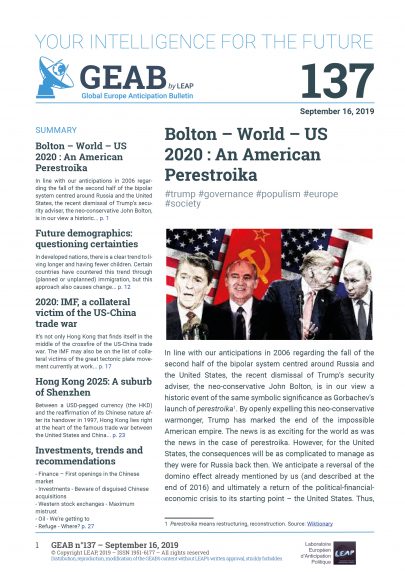GEAB 137
It’s not only Hong Kong that finds itself in the middle of the crossfire of the US-China trade war. The IMF may also be on the list of collateral victims of the great tectonic plate movement currently at work. In recent years, Beijing has increased its voting weight and added the Yuan to the basket of currencies that make up the SDR. But for more than a year, the United States has been blocking the increase in the Fund’s quotas, hindering the IMF’s ability to meet countries’ growing needs. The questioning of the purpose of this institution is not new, but it could reach a critical level in 2020 in the context of the imminent major upheavals.
Changing direction
When Dominique Strauss-Kahn took over its management in 2007, the IMF was in a very poor shape and was forced to sell some of its gold and reduce the number of its staff.[1] Within 4 years, the former French Minister of Economy had refilled the coffers and begun a process of reform of the IMF – a reform which focused on the inclusion of emerging economies (beginning to rebalance voting rights for them, inaugurating interest-free loans for the poorest countries, questioning the requirements for budget cuts associated with loans…). Christine Lagarde continued on this path of adapting the institution to new global realities.[2] Her main achievement was to place the Chinese giant in the “frail” transatlantic structure[3] (doubling its quota so as to increase its voting weight and integrating the Yuan into the SDR[4]) – a highly successful strategy… except that, by winning China, the IMF may have lost the United States.[5] The latter has rejected plans for a further increase in the Fund’s quotas – plans in which they will have difficulty participating, given their economic situation, and which will inevitably lead to a reduction in their influence… and perhaps also a desire not to see the IMF gaining in power.
Login

In line with our anticipations in 2006 regarding the fall of the second half of the bipolar system centred around Russia and the United States, the recent dismissal of Trump's [...]
In developed nations, there is a clear trend to living longer and having fewer children. Certain countries have countered this trend through (planned or unplanned) immigration, but this approach also [...]
Between a USD-pegged currency (the HKD) and the reaffirmation of its Chinese nature after its handover in 1997, Hong Kong lies right at the heart of the famous trade war [...]
Finance – First openings in the Chinese market Our investment recommendations on the Chinese financial market are not easy to follow due to lack of accessibility. However, gradually the Chinese [...]

Comments